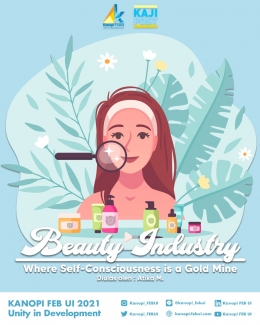Socialized Insecurities
How young were you when you first saw a commercial for a beauty product, portrayed with seemingly perfect people living perfect lives? The likely answer for many of us is probably too young to even remember.
Why is it that, despite recent progress towards representation and diversity, there is still an unspoken wish that many of us still want to look and be perceived a certain way? Though the answer to that question may be too simple to answer with one definitive cause, the Halo Effect is one of the biggest perpetrators.
We all are familiar with the heaps of commercials of beautiful women and handsome men, that conveniently fit the beauty standard, promoting beauty products to enhance our appearances, minimize pores, give shinier hair, and other minor "imperfections" in our appearances. This is an eerily common advertising strategy used by major companies in the beauty industry.
The Halo Effect is a type of cognitive bias where our perception of an identity is positively influenced by their other (often unrelated) traits (Perera, 2021). Many advertisements appeal to this cognitive bias we all inherently have: by portraying picture perfect lives that are (usually) completely unrelated to the product it is actually trying to sell.
Unattainable Beauty Standards and Pretty Privilege
There is a colossal burden placed by society upon everyone to fit into a certain mold in order to be perceived as attractive, which indirectly translates to being valued by others. Though we all know appearances do not represent our value, we cannot ignore that fitting into society's beauty standard gives people a certain amount of privilege, where they are often given 'special treatment'. Additionally, we also should not ignore that many of these advertisements that appeal to cognitive biases are targeted towards a majority demographic of women. "In general, women's purchases account for 80-90% of an estimated $500 billion market for beauty products" (Elsesser, 2019). Undoubtedly, other industries (such as physical fitness) also profit off of the insecurities of men. However, there is a massive gap specifically in the beauty industry and more often than not, its success can be credited to the exploitation of women's insecurities.
Insecurities = More Incentive to Buy = More Money
The beauty industry is first-rate when it comes to capitalizing on women's self-consciousness and insecurities. It has the ability to single-handedly devalue natural human conditions into something that lacks aesthetic and "needs fixing".
This age-long practice along with the impossible beauty standard is a tag team duo constantly reinforcing one another. This can be seen in the vast range of beauty products that cater to women; all the way from 'anti-aging' products, to products that 'minimize pores'. Additionally they advertise by asking vague questions such as "Want to be more confident with your hair?", to leave it to the interpretation of the viewers, thus allowing them to relate it to their own insecurities (Purpora, 2020).








